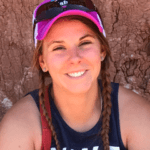
As all the children piled off the school bus in front of the outdoor science school where I worked, there was one child all alone. The last one to get off. That worried me. He was a little smaller than the rest of the fifth graders and dressed in all black with long sleeves and pants despite the beautiful, sunny, 70-degree weather. The students were all so excited to get into their cabin groups and pick their bunks, but not him; he sat alone on his tattered brown duffle bag with his head resting in his hands. As all the students raced to their cabins, I went into the office to look at his file.
Zach.
His name was Zach, and he was in my teaching group for the week. His paper work all read the same thing: hard to work with, detached, severe ADHD.
I was determined to make this week different.
For fifth graders, coming to the science school was a chance to learn outside the classroom. Instead of a room with four walls, they were learning in McCall, Idaho among the giant pine trees and alongside the clear glacier fed, Payette Lake. We would do science experiments in nature like using a tree borer to see how old the tree was (it had a 12-student-trunk circumference), and determining if the lake is a good enough habitat for the alleged Sharlie (our lake monster). The week is always a blast and the children leave with a sense of ownership towards nature.
Zach was beginning to come out of his shell on Tuesday, the second day on their adventure. We were at the Lily Marsh, a magical place, when he spotted a family of Red-Winged Black Birds through his binoculars. His face lit up and he yelled for the other students in his group to come look. He was talking with the others and making connections to what we were learning about that day. Throughout the rest of the week, he and another student, Adrienne, became friends. She was very outgoing and pushed him outside his comfort zone. During group discussions and presentations, she would encourage him to take the lead. It is amazing what young students will do when left to their own devices in nature.
They learned how to test the pH of the lake and why cold temperatures are better for dissolved oxygen. At the end of the week, Zach was the leader of our group, taking charge during team building activities, laughing, and joking with the other students that were not even in his group.
On Friday afternoon as the students were getting onto the bus, Zach’s teacher came up to me. She noticed his transformation and was amazed at my abilities. I looked at her, thanked her for her kind words, but denied my hand in his change. I told her when students experience an outdoor school environment, the ones that struggle in the classroom end up being our best students. Something about nature and being among the trees and wildlife captivates them and allows them to really be themselves.
Zach is one student I will never forget. He is one of the main reasons I chose to continue my path in environmental education at Camp Fire First Texas. Students like Zach are the future. We need to be able to teach them how to be stewards of the land and to respect the world around them. Having programs like the Texas Outdoor Education Center not only help students to find themselves, it helps all of us find and ensure a brighter future for our planet.
 Brooke Guess serves as the council’s Texas Outdoor Education Center Coordinator. She has worked in children for more than eight years, and brings diverse background experience to her role. Brooke received a Bachelor of Science from Western Kentucky University in biology and outdoor leadership and a Master of Science in natural resources and certificate in environmental education from the University of Idaho. She is a Leave No Trace Master Educator as well as a canoe and archery instructor, and is also Wilderness First Aid Certified.
Brooke Guess serves as the council’s Texas Outdoor Education Center Coordinator. She has worked in children for more than eight years, and brings diverse background experience to her role. Brooke received a Bachelor of Science from Western Kentucky University in biology and outdoor leadership and a Master of Science in natural resources and certificate in environmental education from the University of Idaho. She is a Leave No Trace Master Educator as well as a canoe and archery instructor, and is also Wilderness First Aid Certified.






